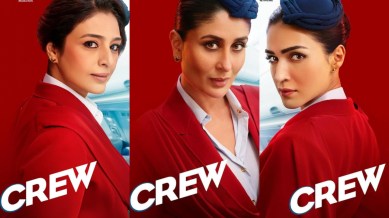How Kareena Kapoor, Tabu’s Crew perfectly embodies the ‘Girlhood’ trend
Girlhood, a trend that allows women––age no bar––to the simple pleasures they may have experienced as girls, has taken over the Internet. And Crew embodies everything that the trend stands for.

Written by Meher Malhotra
Girlhood, a trend that allows women––age no bar––to the simple pleasures they may have experienced as girls, has taken over the Internet. What started off as a fashion trend has now become more of a way of life – a celebration of girls being girls together.
monthly limit of free stories.
with an Express account.
Girlhood is not complicated. Simple acts like getting ready with your girlfriends, clicking photographs with them, and going out on walks, all represent girlhood.
Rhea Kapoor’s filmography has been a reflection of girlhood before it became a trend. The latest movie Kapoor produced––Crew (2024)––embodies everything the girlhood trend stands for. It celebrates women and their agency and portrays female work friendships in a very real manner.
In Crew, the friendships between the characters played by Tabu, Kareena Kapoor Khan and Kriti Sanon – Geeta, Jasmine and Divya, respectively–begin with a sense of obligation but they soon become each other’s genuine support systems. With scenes showing Geeta and Jasmine advising Divya when needed, and Geeta and Divya helping Jasmine when her grandfather dies, the movie conveys how these friendships go beyond the working hours.
Girlhood rose from the fall of the Girlboss era––which was about women hustling to be self-made, rising to C-Suite, and basically eliminating all self-limiting beliefs that stopped women from becoming a ‘boss’ figure––and the characters in Crew reflect that. They do not hustle to break glass ceilings, but simply try to survive and support their families.
There are no self-discovery journeys for they know exactly who they are and do not need to find themselves. There are no self-love proclamations in this film as the characters are beyond striving to be the best, and are just hoping to survive in a world where their weight and looks are still prioritised over their personality.
Girlhood does not discriminate based on age, it’s for you no matter how old or young you are. Crew keeps this in mind and doesn’t unnecessarily age or baby its characters. Tabu, Kareena and Kriti play characters close to their real age.
The trend’s slogan “I’m just a girl” serves as an excuse for embracing stereotypical feminine acts, countering the phrase “I’m not like other girls.” In “Thank You For Coming,” Kanika uses this slogan to express her desire for something as simple as sexual pleasure. While ‘Crew’ lacks bold declarations, it makes a statement by placing three girls in a heist comedy, a rarity in Hindi cinema.
Girlhood may be a recent trend, but Rhea has always woven this cultural phenomenon into her work, emphasising the female gaze. From its title track to the heart-to-heart conversations between Aisha and Pinky, Aisha embodies girlhood in many ways. Veere Di Wedding, too, at its core, is about female friendships and the highs and lows that follow it. Thank You For Coming is centered around female sexual pleasure and the idea that being single is not the worst thing to happen to a woman.
Her films might be seen as too on the nose by some or light-hearted by others, but Rhea consistently delivers her message.